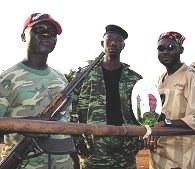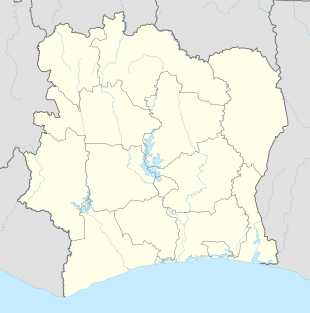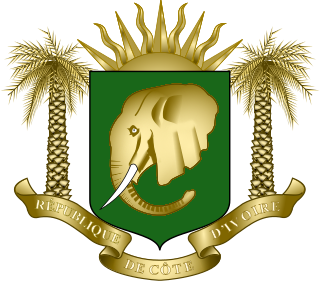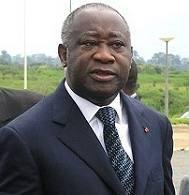History
The revolt began around 2 a.m. on 6 January, [7] when demobilised soldiers in Bouake, who demanded higher salaries and the payment of bonuses, seized weapons and ammunition at the local military base and police stations. [1] They were soon joined by other, still active soldiers, who had served during ECOWAS mission in Liberia, but claimed to not have been paid for taking part in these operations. After some firefights, the mutineers secured Bouaké, blockaded the city's entrances and told the local civilians to stay indoors. No further violence took place at Bouaké, [1] [8] though the mutiny quickly spread to other cities. Soldiers revolted at Daloa's military base; according to some sources, there was a short firefight, [8] [7] while others say that the rebels only shot into the air. In either case, the situation quickly calmed down, with mutineers in full control of the town. A number of rogue soldiers also drove into Korhogo, which was seized without any resistance. [1] Fighting was also reported at Daoukro and Odienné. [8] [7] Though the soldiers at the economic capital Abidjan initially remained calm, [1] many of them also mutinied in the night, so that by the end of 6 January, the mutineers had taken control of five cities, including Abidjan. UN peacekeepers were deployed throughout the country to keep the situation from escalating, [6] while defence minister Alain-Richard Donwahi said he would negotiate with the rebels at Bouaké on the next day. [1]

The Economic Community of West African States, also known as ECOWAS, is a regional economic union of fifteen countries located in West Africa. Collectively, these countries comprise an area of 5,114,162 km2 (1,974,589 sq mi), and in 2015 had an estimated population of over 349 million.
ECOWAS mission in Liberia (ECOMIL) was a peacekeeping force sent by the Economic Community of West African States (ECOWAS) to Liberia at the end of Second Liberian Civil War in September 2003.

Daloa is a city in western Ivory Coast. It is the seat of both the Sassandra-Marahoué District and the Haut-Sassandra Region. It is also the seat of and a sub-prefecture of Daloa Department. Daloa is also a commune. In the 2014 census, the city had a population of 319,427, making it the third-largest city in the country. It lies to the west of Yamoussoukro, the capital of Ivory Coast. Daloa is an important trading centre, particularly for cocoa. The city is served by Daloa Airport and is home to the Roman Catholic Diocese of Daloa, with its cathedral at Cathédrale du Christ-Roi. A future traveler called It the rib of Africa because it is under the shoulder of Africa.1
Most of the revolting soldiers were former members of the Forces Nouvelles de Côte d'Ivoire, a rebel movement which had controlled the northern part of the country until the Second Ivorian Civil War, after which they had been integrated into the regular armed forces. [2]

The Second Ivorian Civil War broke out in March 2011 when the crisis in Ivory Coast escalated into full-scale military conflict between forces loyal to Laurent Gbagbo, the President of Ivory Coast since 2000, and supporters of the internationally recognised president-elect Alassane Ouattara. After months of unsuccessful negotiations and sporadic violence between supporters of the two sides, the crisis entered a critical stage as Ouattara's forces seized control of most of the country with the help of the UNO, with Gbagbo entrenched in Abidjan, the country's largest city. International organizations have reported numerous instances of human rights violations by both sides, in particular in the city of Duékoué where Ouattara's forces killed hundreds of people. Overall casualties of the war are estimated around 3000. The UN and French forces took military action, with the stated objective to protect their forces and civilians. France's forces arrested Gbagbo at his residence on 11 April 2011.
By the next day, the revolt had spread to nine cities: Bouaké, Abidjan, Odienné, Korhogo, Man, Daloa, Toulépleu, Abobo, and Daoukro. [7] [2] In Abidjan, the mutineers went on to take control of and then blockade the military headquarters including the defence ministry with makeshift barricades, [2] and also reportedly attacked a military base belonging to loyalist paratrooper commandos. [9] Fearing the violence could further escalate, Abidjan residents stocked up on food and water. Gunfire was also reported at Man and Bouaké. [10] Donwahi, along with Lt-Col Issiaka Ouattara, deputy commander of the loyalist Republican Guard, went to Bouaké in the early afternoon to negotiate with the rebelling soldiers. [2] [11] They managed to reach a deal with the rebels, who promised to end the mutiny and return to their barracks in return for the promise of higher wages and bonuses. President Alassane Ouattara then went on to say on national television that an agreement had been reached, though criticized the soldiers for their actions: "I would like to say that this manner of making demands is not appropriate. It tarnishes the image of our country after all our efforts to revive the economy." [5] [2]
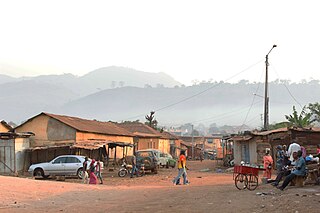
Man is a city in western Ivory Coast. It is the seat of both Montagnes District and Tonkpi Region. It is also a commune and the seat of and a sub-prefecture of Man Department. In the 2014 census, Man had a population of 188,704, making it the eighth-largest city in the country.

Toulépleu is a town in the far west of Ivory Coast, near the border with Liberia. It is a sub-prefecture and the seat of Toulépleu Department in Cavally Region, Montagnes District. Toulépleu is also a commune.

Abobo is a northern suburb of Abidjan and one of the 10 urban communes of this city in Ivory Coast. Abobo is one of the most populated communes in the country with about one million inhabitants in an area of 9,000 ha (90 km2), a density of 111 inhabitants per hectare. Many of the residents are Muslim settlers from the north of the country.
Despite this, a large group of mutineers remained unsatisfied with the deal. These rebels consequently opened fire on the house where the negotiations took place, and declared that they wanted their bonuses to be paid immediately instead of in the following week. A standoff ensued, with the government representatives, including the defence minister, effectively held hostage for several hours. Early on 8 January, however, the mutineers released all hostages. [2]
This page is based on this
Wikipedia article Text is available under the
CC BY-SA 4.0 license; additional terms may apply.
Images, videos and audio are available under their respective licenses.

